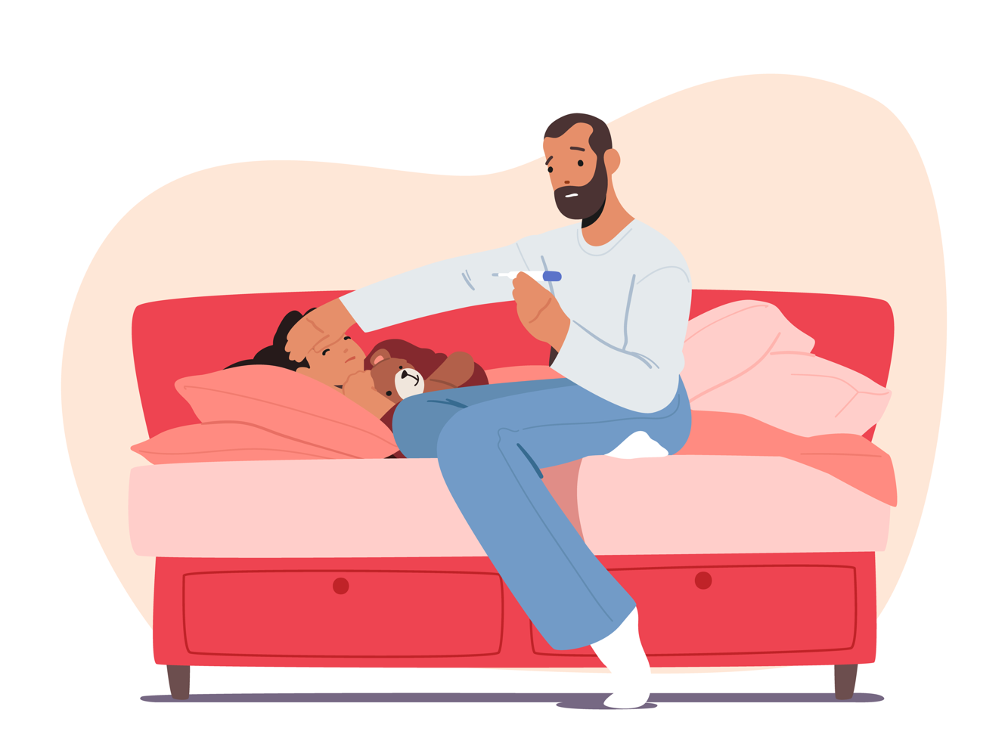Have you ever panicked when your child had a higher body temperature than average? If so, you are not alone. It happens to nearly all parents at some point.
While fevers in children can be frightening, we are here to help put your fears to rest. These pediatric care providers in Northwest Indiana review some of the key things parents should know when their child is dealing with a fever.
Fever is the body’s natural defense.
A fever is when your child’s body temperature reaches 100.4°F or higher. It is a sign that his or her immune system is on high alert and is fighting off viruses and bacteria. Your child’s average body temperature might fluctuate between 97°F to 99°F, but anything higher means you should start to pay attention.
It’s recommended that parents keep an extra close eye on babies younger than 3 months. If your baby’s body temperature reaches 100.4°F or more, it’s time to get on the phone with your pediatric care provider in Northwest Indiana. In many cases, a fever could be an early warning sign of something more serious in infants.
Your child has a fever — do you reach for medicine immediately?
Should you give your child medicine right away after you find they have a fever? It may not always be necessary. If your child is still playful and eating well with a body temperature between 100.4°F and 102°F, you might not need to reach for the meds. However, if he or she is unusually irritable, lethargic or complain of significant discomfort, a recommended dose of ibuprofen or acetaminophen should help.
Keep in mind, if that fever lasts more than a few hours, it’s best to get in touch with your local pediatric care provider in Northwest Indiana.
Addressing ‘fever phobia’
Fever phobia is a real thing. It’s when parents start believing that any fever in their child can cause serious complications like seizures or convulsions. But it’s important to be aware that complications like these are rare unless the fever is over 107.6°F. Most times, it’s just the body doing its job of fixing what’s wrong.
Also, high fever does not always indicate a severe medical condition. Those high numbers on the thermometer can usually be attributed to viruses (which antibiotics can’t do anything about). Febrile seizures are also scary, but they are primarily determined by genetic factors (and not caused by high fevers). Not to mention that many children outgrow febrile seizures by 5 years of age without any lasting effects.
So, when should you call your pediatric care provider?
If you have an infant under 3 months with a body temperature of 100.4°F or higher, you should get in touch with a pediatric care provider in Northwest Indiana as soon as possible. For older children, you should reach out to their doctor if the fever is between 102.2°F and 104°F, lasts more than three days, does not respond to medication within two hours or is accompanied by a stiff neck or disorientation. Rush to urgent care if the fever is 105°F or more.
Remember that sometimes, the best medicine is just some love and care. It also helps to keep your child hydrated with plenty of fluids – water, oral electrolyte solution (like Pedialyte) and maybe even some soothing broth. A lukewarm bath or cold compress can also lower body temperature.
Looking for an Affordable Pediatric Care Provider in Northwest Indiana?
As a parent, it’s important to remember that mild fevers are usually not a warning sign. They only show that your child’s body is actively fighting an infection. However, if the fever becomes worse, you shouldn’t hesitate to get in touch with the experts.
Do you have any questions or concerns about your child’s fever or other symptoms? If so, and if you’re looking to meet with an affordable pediatric care provider in Northwest Indiana, our team at 219 Health Network would be happy to assist you. Contact us today at 833-219-0001 to learn more.


